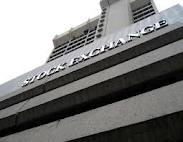By Omoh Gabriel
The demutualised Nigerian Stock Exchange shares will be listed soon at N20 per share as the Securities and Exchange Commission is the final process of giving its consent. A source close to the valuation committee of SEC told Businessnewsreport that the committee has done its work and recommended a share price of N20 per share for the shares of demutualised Stock Exchange. A dealing member of the NSE who confirm the price said that one of the subsidiary of the Exchange currently has a market price value of N15 per share and the Stock Exchange can not be expected to be lower than that.
According to sources at the valuation committee, the Stock Exchange has 255 Dealing members and 177 Ordinary members. He said that the 255 Dealing members were allotted 6,007,788 unit each translating to 1,531,985,940 shares of 50 kobo each while the 177 ordinary members were allotted 2,441,174 amounting to 432, 087,798 shares. He said at a calculation of 1,531,985,940 at N20 per unit would mean that the stakes of the dealing members will be N30,639,718,800 while that of the ordinary dealing members will be N8, 641,755,960 thus giving a total value of . The total number of shares being valued our source said is 1,964,073,738. This he said amounts to N39,281,474,760.
The Nigerian Stock Exchange (“NSE”), a company limited by guarantee, is currently in the process of being demutualised1 into a public company limited by shares (“Plc”). Upon conclusion of the NSE’s demutualisation, its shares will be available for public ownership and it will be subject to the rules and regulations governing companies in Nigeria. This conversion will permit the NSE to carry on business activities with the aim of making profits, as is the case with regular corporate entities. It will also permit the NSE to constitute a board of directors to oversee its operations. Demutualisation has been on the NSE’s agenda for over 10 years. In 2011, demutualisation was discussed in the paper ‘The Roles and Expectations of Regulators in the Demutualisation Process’ issued by the NSE. A 21-member technical committee was also instituted and charged with developing a legal framework for the demutualisation process.
This was followed, in 2014, by the issuance of requests for proposals from local and foreign advisers, to guide the NSE through the process. Subsequently on 12th April 2015, the Securities and Exchange Commission (“SEC”), the regulator of the capital markets in Nigeria, issued the ‘Rules on Demutualisation of Securities Exchanges in Nigeria’, which provided a framework for the process. Notwithstanding, the movement to demutualisation grounded to a halt and it was not until 2017 that the process recommenced.

